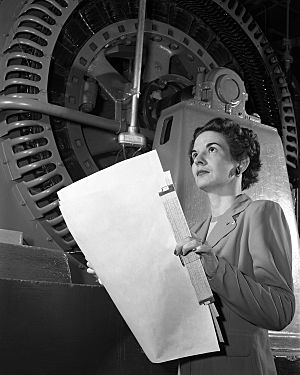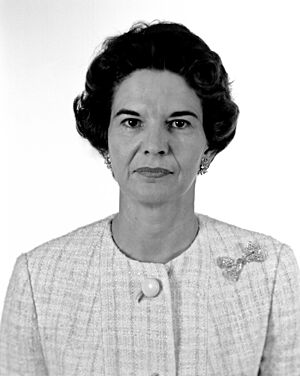Kitty O'Brien Joyner facts for kids
Quick facts for kids
Kitty O'Brien Joyner
|
|
|---|---|

Joyner analyzing the operation of a wind tunnel turbine at NACA Langley in 1952
|
|
| Born |
Kitty Wingfield O'Brien
July 11, 1916 |
| Died | August 16, 1993 (aged 77) |
| Alma mater | |
| Occupation | Electrical engineer |
| Years active | 1939–71 |
| Employer | |
| Organization | IEEE |
| Known for | First woman engineer at the Memorial Langley Aeronautical Laboratory |
| Spouse(s) | Upshur T. Joyner |
| Awards | Algernon Sydney Sullivan Award |
Kitty O'Brien Joyner (born July 11, 1916, died August 16, 1993) was an amazing American electrical engineer. She worked for a government group called the National Advisory Committee for Aeronautics (NACA). Later, she worked for NASA, which took over from NACA in 1958.
Kitty made history in 1939. She was the first woman to finish the engineering program at the University of Virginia. She also received a special honor called the Algernon Sydney Sullivan Award. When NACA hired her that same year, she became their first woman engineer. She eventually became a Branch Head, managing several wind tunnels. Her work helped with research on aeronautics (the science of flight), supersonic flight (flying faster than sound), and designing airfoils (wing shapes).
Contents
Early Life and Education
Growing Up in Virginia
Kitty Wingfield O'Brien was born in Charlottesville, Virginia, on July 11, 1916. Her father was an engineer. This inspired her to want to become an engineer too.
After high school, Kitty wanted to go to the University of Virginia (UVA). By 1920, women were allowed to attend public universities in Virginia. However, UVA had special rules for women. They had to go to another school for two years first. They also had to be at least 20 years old.
These rules were still in place in 1935 when Kitty wanted to apply. So, she went to Sweet Briar College for two years, from 1935 to 1937. After that, she successfully asked UVA to let her in.
Breaking Barriers in Engineering
At first, Kitty didn't think there would be chances for women in engineering. She once told a reporter that she wished she had been a boy so she could follow her father's job. This was when she was at an engineering conference in Florida. Her paper, "Fluorescence, the Light of the Future," won second place there.
Even though the reporter said "electrical engineering is scarcely considered a feminine profession," Kitty used the chance to talk. She explained how engineering offers great opportunities for women and girls.
College Achievements
While at UVA, Kitty was very active. She was the secretary of the Virginia branch of the American Institute of Electrical Engineering. She was also a member of the university's Trigon engineering society. Kitty was also president of her sorority, Chi Omega. She was also president of the Woman's Student Association.
In 1939, she became the first woman to graduate from UVA. She earned a Bachelor of Science degree in electrical engineering. The university chose her for the Algernon Sydney Sullivan Award. This award is given to two graduating students each year. It recognizes their excellent character and service to humanity.
Career in Aeronautics
First Woman Engineer at NACA
In September 1939, the NACA hired Kitty Joyner. She started as a junior civil engineering aide. This made her the very first woman engineer at their Langley Memorial Aeronautical Laboratory. This center later became the Langley Research Center.
At that time, NACA was growing its research into aeronautics. This was happening before World War II. Kitty's career quickly changed. She moved her focus from civil engineering to electrical engineering.
Managing Wind Tunnels
One of her important jobs was managing the electrical systems for several wind tunnels. These included supersonic wind tunnels. These were large and expensive facilities. They were very important for testing aircraft designs.
Kitty kept working at Langley for over 30 years. She continued her work at NASA when it took over from NACA in 1958. By the 1960s, she became the Branch Head of the Facilities Cost Estimating Branch. This was part of the Office of Engineering and Technical Services.
Contributions to Flight Research
During her career at NACA and NASA, Joyner helped a lot with research. She worked on aeronautics, supersonic flight, and the design of airfoils. Her work was important for both military and commercial airplanes. She also helped create aircraft design standards. These standards were used for many years.
She retired from NASA in May 1971. Kitty was also active in engineering groups. She was a member of the Institute of Electrical and Electronics Engineers (IEEE). She was also an Honorary Life Member of the Engineers Club of the Virginia Peninsula.
Personal Life
Family and Retirement
Kitty O'Brien married Upshur T. Joyner. He was a physicist who also worked at NACA and NASA. He was known for his work at the NASA Langley Landing Loads Dynamics Facility.
They had two children together. Their son, Upshur O'Brien Joyner, passed away from leukemia at age 47 in 1990. They also had a daughter named Kate Bailey. In 1971, both Kitty and Upshur retired. They lived in Poquoson, Virginia.
Community Involvement
Besides her engineering work, Kitty was part of several organizations. She was a member of the P.E.O. Sisterhood. She also belonged to the Daughters of the American Colonists and the United Daughters of the Confederacy. In 1992, the United Daughters of the Confederacy gave her the Winnie Davis Award. This award recognizes great dedication to the organization.
She also helped start the Charles Parish Chapter of the Daughters of the American Revolution. She was its first regent (leader). This chapter later named an annual scholarship after her.
Kitty Joyner passed away on August 16, 1993, at 77 years old. Her husband passed away a few months later, in November 1993, at age 85.
See also
 In Spanish: Kitty Joyner para niños
In Spanish: Kitty Joyner para niños
 | Roy Wilkins |
 | John Lewis |
 | Linda Carol Brown |


